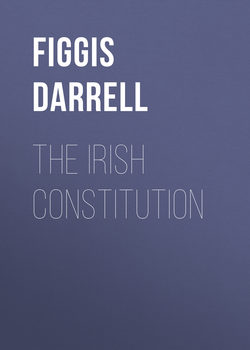Читать книгу The Irish Constitution - Figgis Darrell - Страница 4
The Irish Constitution
III.
THE MAKING OF LAWS
ОглавлениеAll powers of Government may derive from the people, but the people cannot of themselves govern themselves. In simple small communities the people may gather together and frame the manner of their government from meeting to meeting (and only then when ancient custom has given them the practice and expectation of such assemblies); but among nations for a people to discipline and rule themselves it is necessary that they bestow recognised and definite powers of government on representatives of their choice. Such representatives, to be sure, have a habit of conceiving that they are rulers of their own right. Cases have even been known where they have endeavoured to obstruct the right of the people to depose them. But the truth is that such representatives are merely a convenience. They are a people’s instruments, and no more. Without them the achievement of a common agreement, and the formulation of laws based on that common agreement, would prove so cumbersome as to be impossible. A people must therefore tolerate them with good humour; and keep them under proper control. And when such representatives have been chosen, they together form an organised body for the making of laws, and for the supervision and control of the execution of such laws.
Obviously, then, once a Constitution has stated the sovereign source of all authority, and defined the fundamental rights of that sovereignty, it is essential that it should prescribe the manner in which laws shall be made for the peace, order and good government of the whole people. The second section of the Constitution, therefore, deals with the Legislative Provisions of the State. The most important of these, manifestly, is the creation of an organisation of representatives; but, owing to the tendency of representatives to arrogate powers to themselves, of late years the peoples of many States have insisted on a direct voice in the checking, and even in the making, of laws. This direct voice has been exerted by means of two instruments known generally as the Referendum and the Initiative. Wherever these prevail, the Assembly of Representatives is given only a limited power in the making of laws, the sovereign authority reserving to itself a constant and continuous control over its action. And in our Constitution both these instruments are given a place. For it is a sound rule that the people are generally better than their representatives – wiser of counsel, more disinterested of judgment – and it is therefore provided in the Constitution that there shall be an Assembly of Representatives, but that the people may require of that Assembly that laws be referred to them for final decision, or that laws be made to suit their desire.
The most important part of these legislative provisions, however, is the setting up of a National Assembly, or Synod, to be known as the Oireachtas. This is to be formed of two Houses, Dail Eireann and Seanad Eireann. There are many powerful arguments against the two-chamber system. In the end they all resolve themselves into a question of ultimate responsibility. In a simple illustration, if there be one thimble and one pea, it is easy enough to know where the pea is. But directly a second thimble is brought up beside the first, the difficulty of placing the pea becomes at once a problem. On the other hand, the arguments in favour of a second-chamber system also resolve themselves into a question of responsibility. For if there is only one chamber, without a second to check it and act together with it, there is, it is argued, a greater likelihood of its acting in an irresponsible manner, and of its running into hasty, ill-advised legislation. Its members, having acquired the habit of concerted action, may moreover strike a bargain behind the people’s back, even while preserving all the forms of opposition and discussion. With the two instruments of the Referendum and the Initiative in operation this danger is less likely, provided that the people be sufficiently alert. Yet it exists. In most countries, therefore, two chambers are the rule; and in our Constitution it is provided that there shall be two chambers, care being taken to fix responsibility ultimately in the first in case of doubt or delay.
